News
Superfast broadband rollout criticised

Ed Hunt: Superfast boss was grilled by audience
A MEETING was held on Wednesday for those living in rural communities to express their concerns over the BT Superfast internet rollout.
The Director of Superfast Cymru, Ed Hunt, attended the meeting, held at Whitland Memorial Hall, to answer questions from those concerned about delays and omissions from rollout. BT has claimed that 95% of the population of Wales will have access to fibre broadband.
Although the meeting started at 6pm, the hall was packed to capacity, with more than 80 people in attendance. It was immediately evident that the topic resonated with many in the area.
Most of those present were from the rural west Carmarthenshire and east Pembrokeshire area, where a number of communities are hampered by very slow internet speeds – down to less than a megabyte per second (MBPS). By contrast, those receiving the full benefits of the Superfast upgrade will reach speeds of 24-32 MBPS.
Mr Hunt began by pointing out that the reason that the Welsh Governmentsubsidised scheme had been rolled out was ‘because no communications company wanted to take the risk.’
“I’m not the problem – I’m fixing the problem,” he added, stating that without BT there would be no Superfast Broadband at all in the region.
Defending criticisms that the rollout was too slow, Mr Hunt claimed that the Welsh rollout by BT was the fastest in the UK. He added that New Zealand, which he described as a similar kind of country to Wales, aimed to have reached 85% of people by 2023. “Wales will have achieved that by next year,” he said.
It was also claimed that Wales was in a better position in terms of Superfast coverage than France, Germany, the United States, and the rest of the UK.
However, Mr Hunt acknowledged that ‘you guys are here because you haven’t got it – I understand.’
He explained that the contract with the Welsh Government did not cover 100% of Welsh houses, and expressed doubt that in some cases it was even possible to provide a service. “Some people here are not going to get good news,” he added, before explaining that there were certain grants available from the Welsh Government to assist in these cases.
Mr Hunt also pointed out that those present were in a minority in more ways than one, and that only around 12% of the population of Carmarthenshire had taken up the Superfast option. In Pembrokeshire, around 25% had.
“Providers won’t come down here, because there is not the clamour for the service that people think there is,” he claimed.
However, a number of residents present seemed less-than-convinced with the glowing picture painted. Whether or not, as was implied, this was because most of those present were among the have-nots, the questions from the floor offered a wide-ranging criticism of the rollout and general BT policy in the region.
Simon Hart MP, who organised the meeting, pointed out that vagaries in the rollout times had stopped people taking up temporary solutions like satellite internet for fear of losing out financially.
In response to a point made by Mr Hunt, who had said that BT was willing to work with customers in locations outside the rollout if they were willing to carry out some of the infrastructure work or costs themselves, he pointed out that a pensioner in his constituency had been quoted £180,000 by BT to get the full service.
Mr Hunt said that this ‘illustrated the difficulties of the project.’ He suggested that possibly a local resident with a JCB might like to lend a hand to keep the costs down.
BT was accused of neglecting the existing network in the race to install fibre-optic cable, with a number of people claiming that they had been without the internet for lengthy periods over the winter due to repeated cable breakages.
One Whitland resident pointed out that they were unable to get even 1MBPS ‘one-and-a-half miles from the A40’ and asked why it wasn’t possible to get even 2MBPS through the existing copper network.
Mr Hunt’s claim that ‘we don’t have a reliability problem’ was met with a chorus of ‘no, we do’ from the audience. He pointed out that he was ‘not in business to provide a 2MBPS service’ and advised the questioner to ‘take it up with the Welsh Government.’
An audience member from Meidrim pointed out that work there had been delayed for several months because the cable had to cross a level crossing.
In response, Mr Hunt said: “I don’t have to deliver to your house by the end of March, but I have to deliver to a certain number of properties across Wales. If we have snags, I am entitled to move engineers when I see fit.”
Another Meidrim resident was somewhat disgruntled that a fibre cable between two exchanges ran past her garden gate, while she was only able to get 2KBPS internet in her house.
The number of properties which would actually benefit from ‘Superfast’ speeds of more than 15MBPS was also questioned, given that any property more than 1.5km from a cabinet would only get fast broadband. The Village Clerk for Martletwy claimed that she had checked online, and out of 300 properties in the area only 15 would get the full Superfast benefits.
Several representatives of the business community pointed out that good broadband service was essential for attracting and running businesses in the region. Given the focus on tourism in west Wales at present, it was also noted that decent internet speeds were a priority for those booking holiday cottages, which often tend to be in more remote areas.
In response to those who asked why south east Wales had received the service upgrades first, Mr Hunt replied that due to the project being delayed by external forces at the beginning of the rollout, BT had been forced to concentrate on areas with higher population density in order to meet the targets set and avoid jeopardising EU grant money.
As the tone of the questions became increasingly heated, Mr Hunt said: “I can’t give all the people the answer they want tonight. I didn’t have to come here, but I am happy to.”
He also reiterated that: “if it wasn’t for BT coming in and putting money on the table, you would have nothing.”
It is worth noting that BT has made a £220m investment in the project, which has an estimated payback time of 15 years.
Mr Hart pointed out that in his opinion, given where internet provision was in this region 5-10 years ago this was ‘still a good news story’. He also refuted Mr Hunt’s claim that all those present were there because they didn’t have access to the service: “We are all here not just because we don’t have Superfast broadband, but because of confusion about when we are going to get it,” he added.
However, the last word was had by a gentleman who referred back to previous concerns about copper cables from exchanges to houses: “Superfast broadband is theoretical, and will remain entirely so for everyone in this room until the copper cables are replaced,” he said.
After the meeting, a number of one-to-one sessions were had with audience members, who received answers to specific questions about service provision.
Speaking to audience members, a number believed Mr Hunt had been somewhat arrogant in his approach, and his remark that he ‘didn’t have to come here’ was quoted more than once. However, others were more encouraged, with one lady saying he was ‘a brave man for coming!’
A common theme was a perceived lack of maintenance to the existing system – something that Mr Hunt had earlier refuted – and the communication between the company and residents was described as ‘abysmal’.
Simon Hart said that he hoped the meeting had been ‘the first of a process’.
When we suggested that these problems were only experienced by a small minority of residents, he said: “I don’t buy the argument that most people are happy. As long as one person is left out in the cold we should pursue this vigorously.
“We have heard quite legitimate concerns tonight. People understand that this is a slow, expensive process, but want to hear the truth, and to have things explained to them.
“I hope that the BT representatives leave here tonight realising that it is not all a good news story.”
However, Mr Hart refuted criticism of Mr Hunt’s perceived ‘arrogance’: “If I was in their shoes, if your life is spent working for BT, I think you will be quite defensive,” he said.
“What tonight was about was saying that yes, we are grateful, but there are areas that need to be addressed.”
Community
Anzac Day commemoration service held in Milford Haven
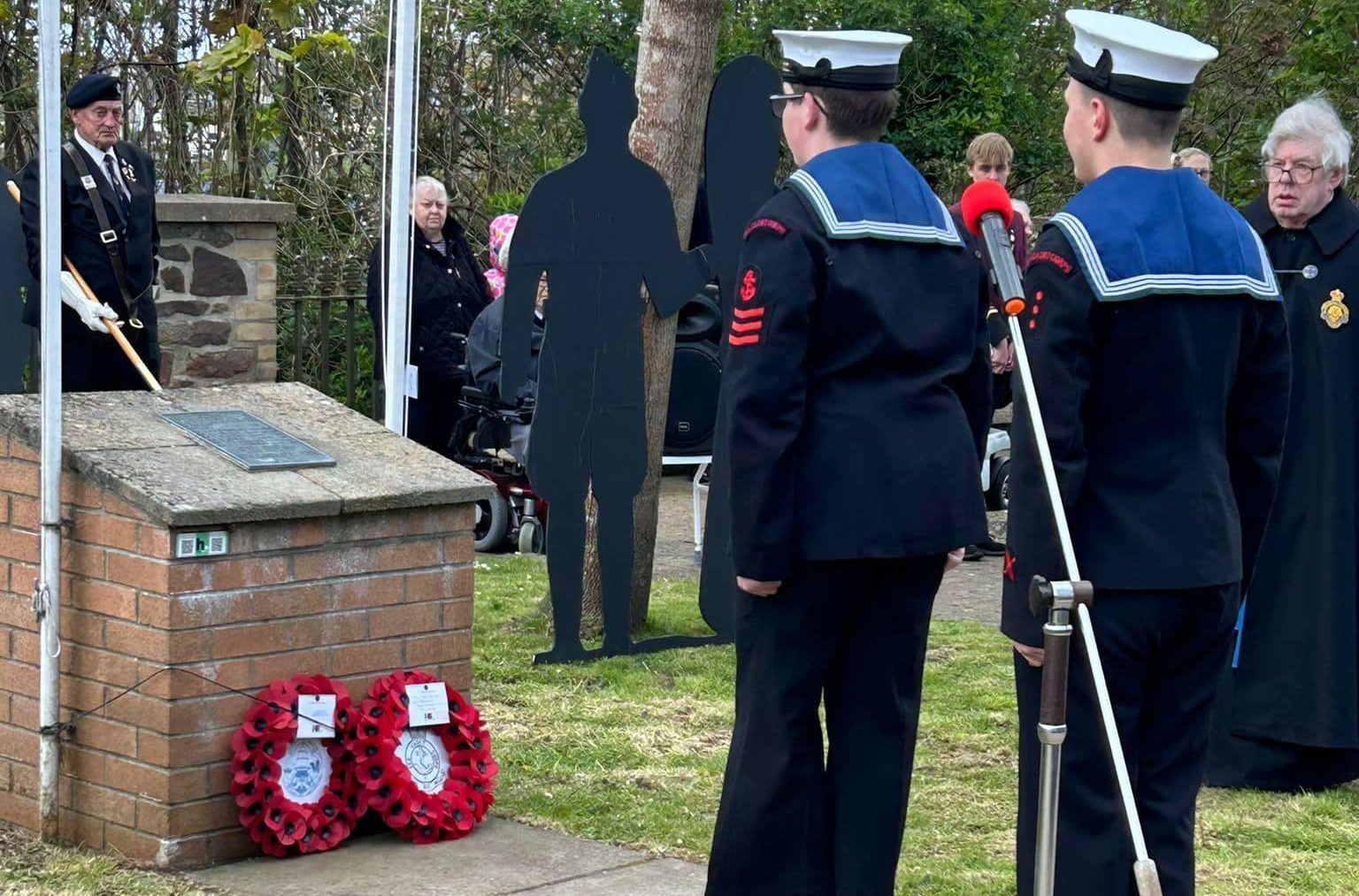
IN a service held on Sunday (Apr 28), the Milford Haven Branch of the Royal British Legion led a poignant commemoration service to mark Anzac Day, honouring the valor and sacrifices of the Australian and New Zealand Army Corps (ANZAC) during the Gallipoli campaign in World War I.
The service, which took place at 11:00am, on Hamilton Terrace, Milford Haven, witnessed a significant turnout.
Attendees included members of the Australian Signals and Signal Company as well as representatives of Milford Haven Town Council and the Milford Haven Sea Cadets.
The service commenced with a welcome and introduction by Lt Col Warren Coetzer, followed by a rendition of the National Anthems of Australia, New Zealand, and Wales, embodying a spirit of unity and remembrance. The anthems were a moving tribute to the camaraderie and international bonds formed in times of conflict.
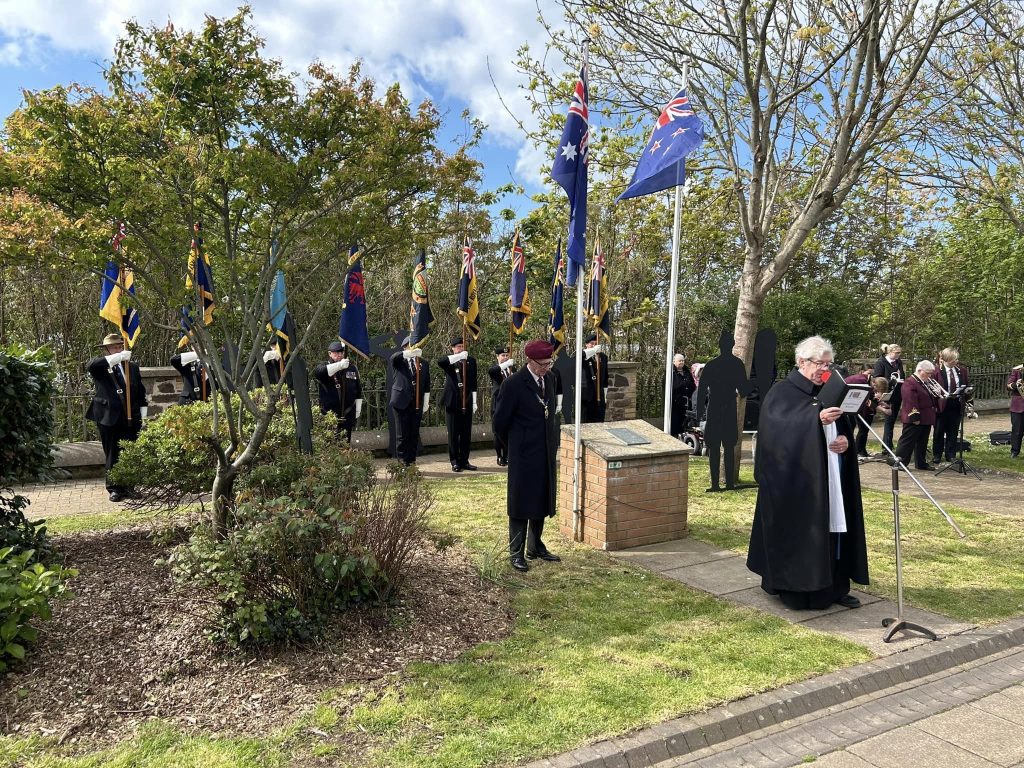
During the service, the Ode of Remembrance was recited, a profound moment that prompted reflection on the courage and fellowship of the ANZAC forces.
The emblematic Rising Sun Cap Badge and the Union Flag were prominently displayed on the event programme, symbolising the service and sacrifice of those who served under them.
Local dignitaries laid wreaths, and a two-minute silence was observed, offering a chance for personal reflection on the cost of war and the price of peace.
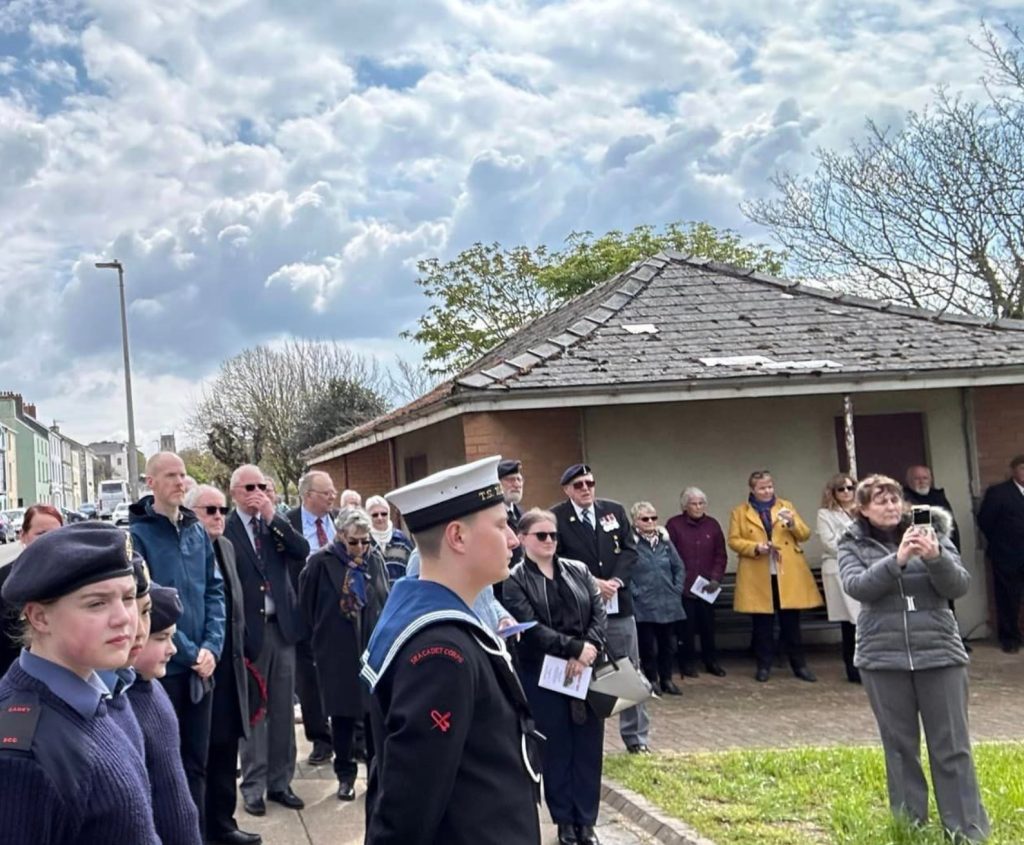
The commemoration concluded with a prayer for peace, leaving the attendees with a message of hope and a renewed commitment to the values for which the ANZAC soldiers bravely fought.
The service was not just a remembrance of past sacrifices but also a reminder of the enduring spirit of the ANZACs, which continues to inspire and guide future generations.
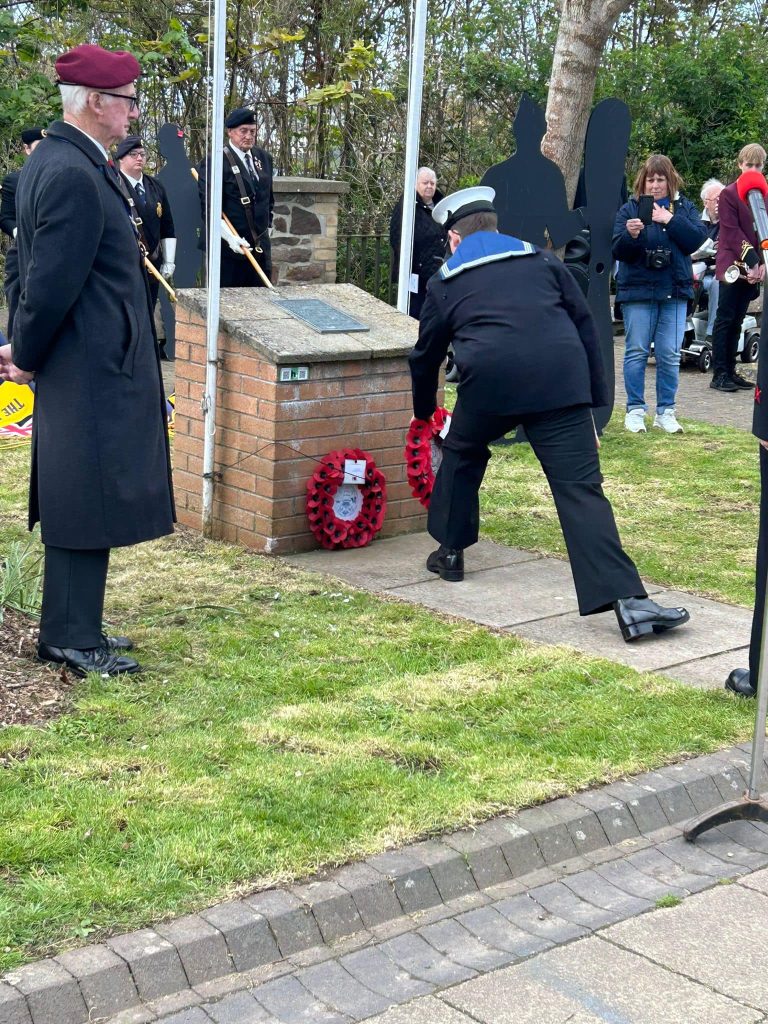
Community
Survey of Picton Castle reveals groundbreaking medieval architecture

THE first ever detailed architectural survey of Picton Castle, Pembrokeshire, has revealed a medieval castle ahead of its time in terms of design and high status living. Much altered in the Georgian period, the castle was surveyed by the author, Neil Ludlow, with Phil Poucher of Heneb – Dyfed Archaeology (formerly Dyfed Archaeological Trust) and funded by the Castle Studies Trust: it reveals a sophisticated building fit for royalty.
However, the building was actually built between 1315-20 by a senior royal government official called Sir John Wogan, who held office in Pembrokeshire, Northern England and Ireland and possibly fought on a military campaign in Gascony.
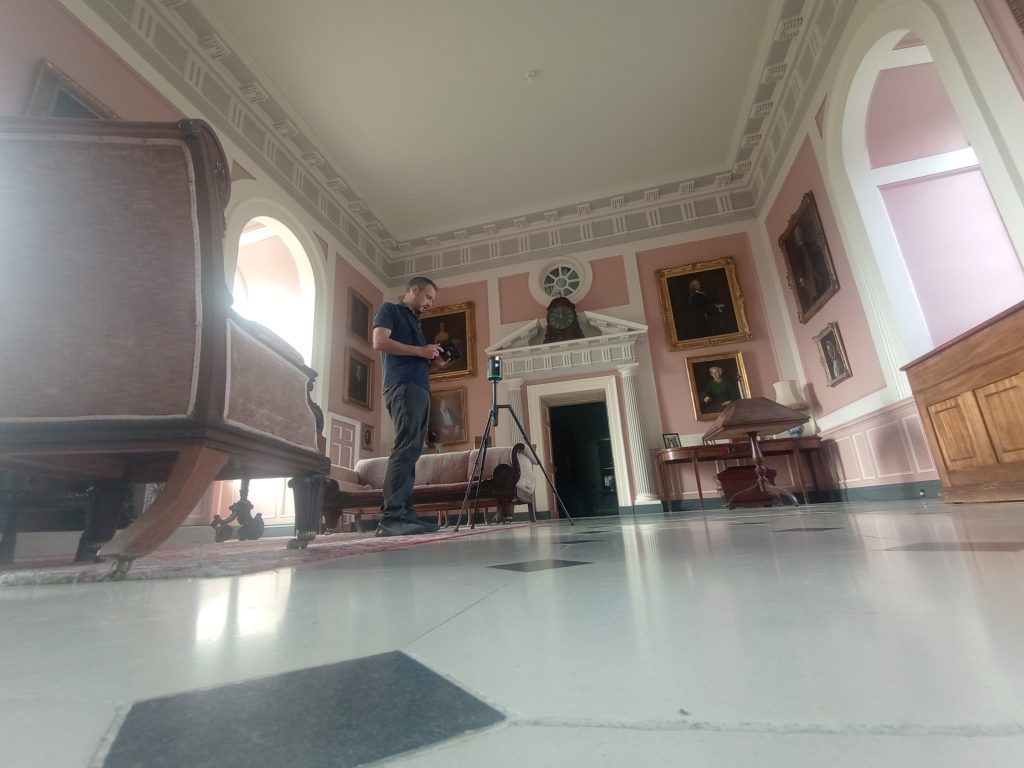
While outwardly it retains much of its medieval flavour, the interiors were extensively made over during the eighteenth century so that it now presents itself first and foremost as a Georgian country seat. But beneath this veneer, much medieval work still survives – though a lot of it is tucked away behind stud-walls, in cupboards, or is otherwise obscured.
Picton’s unique layout makes it a castle of great importance and architecturally ground-breaking for when it was built in the early fourteenth century. Most castles have at least some close parallels, but Picton is effectively one of a kind. Close study shows that it resolves as a central first-floor hall, flanked by services and a chamber-block to form a very early example of the three-unit ‘H-plan’ house.
The gatehouse – unusual in buildings of this kind – led onto an equally unusual ‘grand stairway’ to the hall; a second ground-floor entry probably led to an external kitchen and bakehouse.
The castle’s spatial disposition, access and circulation are meticulously planned, while the domestic appointments show a remarkable level of sophistication for the period, including what appear to be vertical serving-hatches between the ground floor and the service rooms above. At second-floor level, the east towers and gatehouse form two integrated suites of residential apartments either side of a chapel, in a manner firmly rooted within royal planning. The opposite pair of towers, at the west end, seem to have been united internally to form a residential chamber-block, for Wogan’s officials and guests, possibly served by latrines in the former west tower; the present partition walls are later.
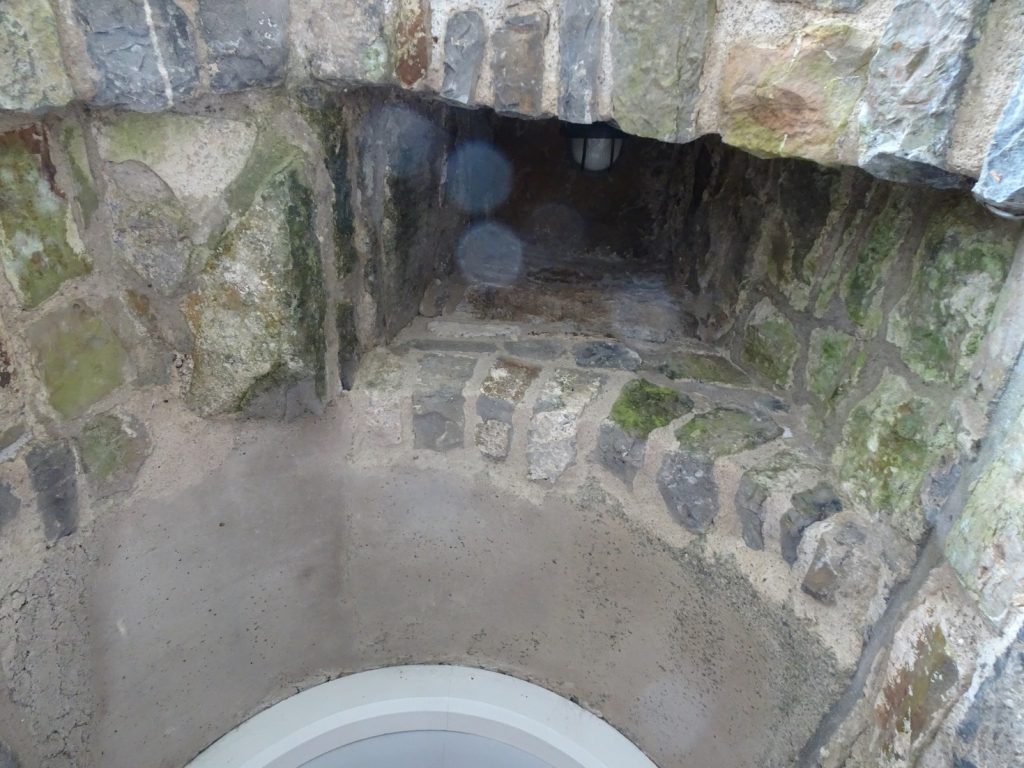
Neil Ludlow told The Pembrokeshire Herald: “The enigmatic castle at Picton in Pembrokeshire is best-known for its magnificent Georgian interiors. But beneath this veneer is a medieval castle, from around 1315-20, with a unique layout. A towered hall-block with a pioneering ‘H-plan’, it reveals elements derived from royal planning, and sophisticated domestic arrangements including serving hatches between the floor levels. These innovations show it to have been a castle that was ahead of its time.”
Castle Studies Trust Chair of Trustees Jeremy Cunnington added: “The Castle Studies Trust is delighted to have funded the first ever detailed survey of Picton Castle and to have learned so much more about the medieval form of this unique building.”
Dr Rhiannon Talbot-English, Director at Picton Castle Trust told this newspaper: “Picton Castle has always been something of an enigmatic mystery: hidden gothic alcoves and arches, secret spiral staircases and untouched medieval Undercroft. Picton Castle Charitable Trust is extremely grateful to the Castle Studies Trust for its generous financial support which has enabled this research to be undertaken and we look forward to sharing this new knowledge with the public in a new exhibition about the early castle.”
Community
Solemn tributes at Freshwater West for WWII maritime tragedy

IN an emotional gathering at Freshwater West, Pembrokeshire, the public and veterans convened on April 29, to honour the memory of the 85 souls lost in the tragic sinking of Landing Craft, Gun (LCG) 15 and LCG 16 during a brutal storm in April 1943.
The memorial service took place near the scenic, surf-popular beach, where the community assembled to reflect on the calamity that struck during a perilous wartime operation.
The service highlighted the sacrifices made by those aboard the LCGs, as well as six valiant crew members from the HMS Rosemary, who perished while attempting a daring rescue amidst the tempest.
Originally designed as Landing Craft, Tanks (LCTs), LCG 15 and LCG 16 were converted at Belfast’s Harland & Wolff shipyard to support amphibious operations by equipping them with heavy artillery.
Their redesign included the installation of two 4.7 inch guns intended for use during D-Day, suggesting that, had they survived, these crafts and their crews could have played a pivotal role in the Normandy Landings.
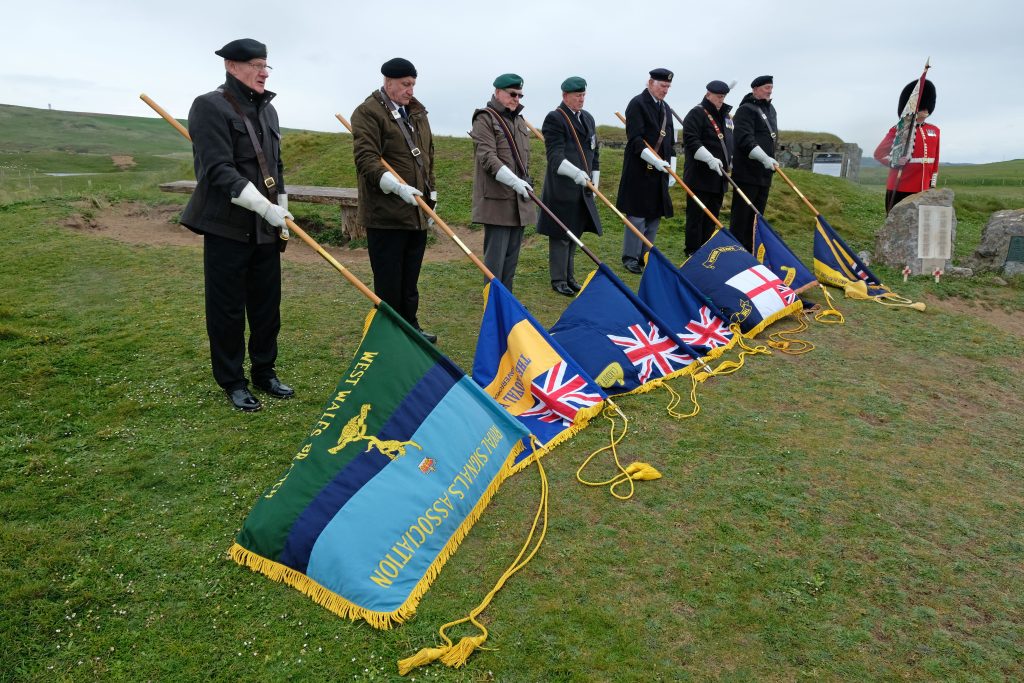
The crafts were en route to Falmouth when they encountered severe weather off the coast of Freshwater West.
Compounded by their flat-bottomed design, which was ill-suited for rough seas, both vessels tragically succumbed to the stormy conditions.
Denied shelter at Fishguard, they were compelled to continue towards Milford Haven, a decision that ultimately led to their sinking.

Today, the wrecks of LCG 15 and LCG 16 lie as protected war graves, and a poignant memorial stands overlooking the beach, a testament to the bravery and enduring legacy of the men lost to the sea.
Visitors to the memorial site at Freshwater West, which also hosts another commemorative marker at Thornton Cemetery in Milford Haven, can reflect upon the harrowing experiences faced by wartime naval personnel and the profound impact of their service.
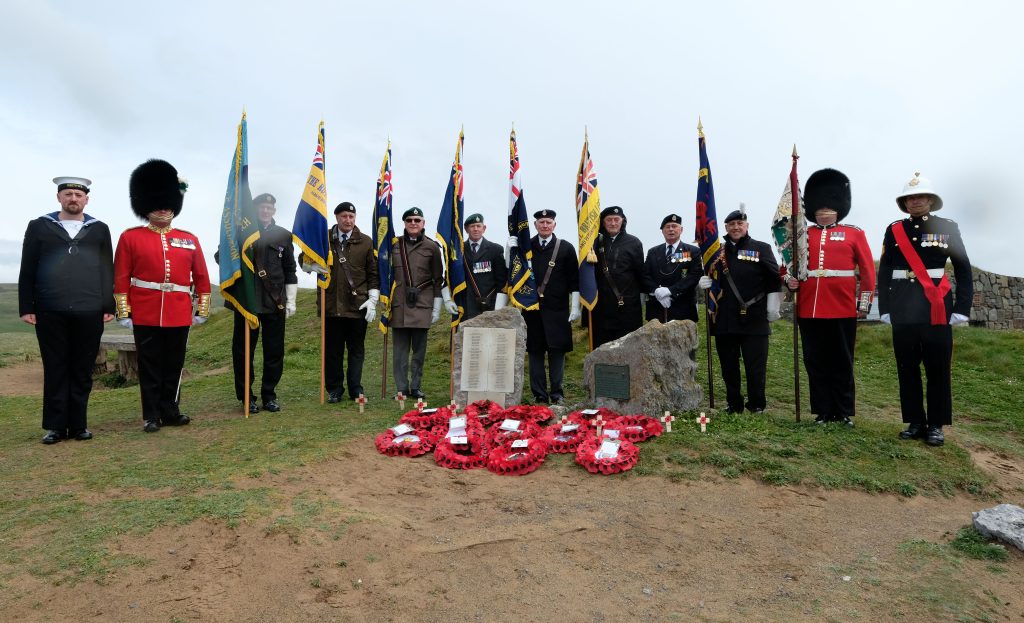
The event served not only as a remembrance but also as an educational experience, particularly for younger generations unaware of the perils faced by their forebears during such tumultuous times.
The memorial at Freshwater West remains open to the public, offering a place for contemplation and respect, against the backdrop of one of Wales’ most beloved surfing beaches, where the echoes of history resonate with the sounds of the waves.
Pictures by Martin Cavaney
-

 News5 days ago
News5 days agoPolice and air ambulances at ‘serious incident’ at West Wales school
-

 Business3 days ago
Business3 days agoLargest Welsh port appoints communications and marketing director
-

 Crime5 days ago
Crime5 days agoPembrokeshire pensioner accused of 17 sexual offences against children
-

 Crime4 days ago
Crime4 days agoAll three school stabbing victims discharged from hospital, police confirm
-

 Community6 days ago
Community6 days agoCounty Hall to offer space for community banking
-

 Crime7 days ago
Crime7 days agoBrian Davis: Wanted on suspicion of commercial burglary
-

 Sport6 days ago
Sport6 days agoSwifts eyes on double.
-

 Community3 days ago
Community3 days agoSuspected explosive device found on west Wales beach

























